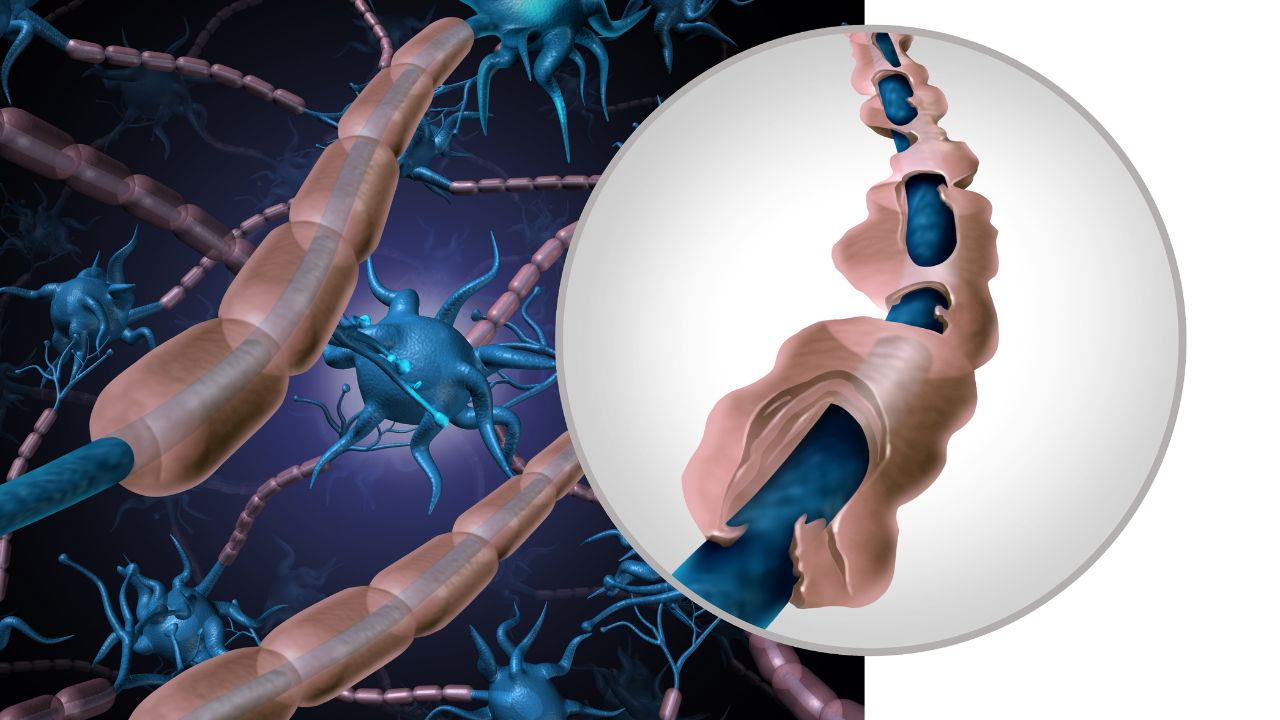The NHS is leading the way in multiple sclerosis (MS) care with the widespread rollout of a new “take at home” tablet. This treatment, cladribine tablet, promises to improve the lives of thousands of people living with active MS.
Understanding Multiple Sclerosis
Multiple sclerosis is a complex neurological condition that affects the central nervous system (brain and spinal cord). In MS, the immune system mistakenly attacks the myelin sheath, a protective layer surrounding nerve fibres. This attack disrupts communication between the brain and the rest of the body, leading to a range of symptoms.
These symptoms can vary widely and may include:
- Fatigue
- Difficulty walking
- Vision problems
- Numbness or tingling
- Muscle spasms
- Pain
- Cognitive dysfunction
MS is a lifelong condition, and while there is no cure, treatments can help to manage symptoms and slow down disease progression.

The Challenges of MS Treatment
Traditionally, treatments for MS have often involved significant burdens for patients. These can include:
- Frequent hospital visits: Some medications require regular infusions, meaning patients must travel to and spend time in the hospital.
- Self-injections: Other treatments involve frequent self-administered injections, which can be painful and inconvenient.
- Extensive monitoring: Regular blood tests and MRI scans are often necessary to monitor treatment effectiveness and side effects.
These treatment demands can significantly impact a person’s daily life, affecting their work, social activities, and overall well-being.
Cladribine: A New Approach
Cladribine offers a different approach to MS treatment. It is a tablet that patients can take at home in short courses. This treatment regimen is designed to reduce the frequency of relapses and slow down disease activity.
How Cladribine Works
Cladribine works by selectively reducing the number of certain white blood cells (lymphocytes). These cells are thought to play a role in the immune system’s attack on the myelin sheath in MS. By reducing the number of these cells, cladribine tablet can help to reduce inflammation and damage to the central nervous system.
Benefits of Cladribine Tablet
Cladribine offers several potential advantages for people with MS:
- Reduced need for hospital visits: The oral administration and short-course regimen of cladribine mean that patients can manage their treatment at home, reducing the need for frequent hospital infusions.
- Increased convenience: Taking a tablet at home is generally more convenient than receiving infusions or injections. This can improve a person’s ability to manage their condition alongside their daily life.
- Flexibility for family planning: Cladribine may offer more flexibility for women with MS who are planning to start a family, compared to some other MS treatments.
NICE Approval and NHS Rollout
The National Institute for Health and Care Excellence (NICE) has approved cladribine for use in the NHS for adults with active relapsing-remitting MS. This approval is based on clinical trial evidence that has demonstrated the effectiveness and safety of cladribine.
The NHS is now rolling out cladribine, making it available to eligible patients across the country. This wider availability is expected to benefit thousands of people living with MS.
Impact on the NHS
The adoption of cladribine tablet not only benefits patients but also has a positive impact on the NHS:
- Reduced burden on services: By decreasing the need for hospital visits and infusions, cladribine can help to free up clinic time and resources. This allows healthcare professionals to see more patients and improve overall service efficiency.
- Cost-effectiveness: While cladribine is a medication, its ability to reduce the need for other healthcare interventions may make it a cost-effective treatment option in the long term.
The Role of Healthcare Professionals
Healthcare professionals play a crucial role in the successful implementation of cladribine treatment. This includes:
- Identifying eligible patients: Clinicians need to assess patients to determine if cladribine is the right treatment option for them.
- Providing patient education: Healthcare professionals must provide patients with clear and comprehensive information about the benefits, risks, and administration of cladribine.
- Monitoring treatment: Regular monitoring is necessary to assess treatment effectiveness and manage any potential side effects.
Total Assist’s Commitment to MS Care
Total Assist is dedicated to supporting healthcare professionals in the field of MS care. We provide a range of staffing solutions, including:
- Locum and permanent roles for neurologists
- Specialist MS nurses
- Other allied health professionals
We connect skilled professionals with healthcare providers to ensure that patients receive high-quality care.
A Positive Step Forward
The availability of cladribine tablet represents a positive step forward in the treatment of active relapsing-remitting MS. It offers a new option that can improve the lives of patients while also benefiting the NHS. As research continues, we can expect further advancements in MS care, bringing hope for a better future for those living with this condition.
Disclaimer: This blog post is for informational purposes only and should not be considered medical advice. Always consult with a qualified healthcare professional for personalised advice and treatment.

